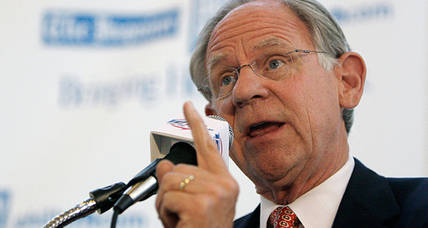This is the second in a series of posts analyzing the language used in debates about campaign finance laws and regulations. Supporters of increased regulation of campaign financing, like all public policy advocates, have a specific lexicon that they use in order to bolster their arguments and convince the public that action is needed. Unfortunately, much of this language is deliberate obfuscation – meant to conjure up an honorable ideal in the eyes of the public, while supporting actual policy that has utterly different goals and effects. These posts are meant to clear up these misconceptions.
This post will deal with the newest entrant to regulators’ political lexicon, “dark money.”
What Do We Think it Means?
“Dark Money” conjures up this image of secret evil – an amalgam of Rich Uncle Pennybags and Darth Vader, who is covertly controlling all of American democracy. The phrase plays on our basest fears. We don’t know what “Dark Money” is (How could we? We can’t see it!), and we don’t know exactly what “Dark Money” buys or who is spending it (Of course we don’t! It is purposefully hidden from us!), but we are told it is there, lurking in the shadows of political campaigns, allowing billionaires to “buy elections.” When we think about “Dark Money,” in short, we get scared and feel the need to get rid of this bogeyman that is supposedly haunting our elections.
What Does it Really Mean?
It turns out, however, that “Dark Money” is not that “dark” after all.
Take, for example, this recent USA Today editorial decrying the influence of “Dark Money.” The editorial ominously warns us that, “[w]hat’s really scary is that many donors don’t have to reveal who they are or what they want from politicians.” The article then goes on to tell us exactly who these secret donors are and specifically what they want from politicians. It tells us about, “Americans for Prosperity, the most active group on the right … led by conservative billionaires Charles and David Koch, who vehemently oppose Obamacare and are seeking to elect as many Republicans to Congress as possible.” Now if this organization is somehow secretly destroying American democracy and buying elections, how does USA Today know who they are, who their primary donors are, and what their political position is? How exactly is this “Dark Money?”
This is not unique to Americans for Prosperity. The same article discusses the top Democratic “Dark Money” group, “the union-backed Patriot Majority USA” and outlines its ties to Senate Majority Leader Harry Reid. In fact, here is a list of all of the top “Dark Money” groups in the 2014 election cycle, courtesy of the Center for Responsive Politics. Think about that for a second. If one can track to the dollar the amount of money spent, the organization that spent that money, and the ideology of that organization, how is this different from other campaign spending? Again, how is this “Dark Money?”
The answer is that supporters of even more stringent campaign finance regulations have a definition of “Dark Money” that is far less scary than the name implies. “Dark Money” organizations are simply nonprofits, which engage, in part, in advocacy about particular issues relevant to the electorate and their members, but that do not disclose their individual donors to the Federal Election Commission. These nonprofits – generally well-known 501(c)(4) advocacy organizations, like the National Rifle Association or Sierra Club, or established 501(c)(6) trade associations, like the National Association of Realtors or the U.S. Chamber of Commerce – are limited by the IRS as a condition of their tax-exempt status to what amount of their activity may be deemed “political.” These groups and their viewpoints are well documented, and they disclose large amounts of information about their political activity. This is precisely why groups like the Center for Responsive Politics are able to track “Dark Money.”
So regardless of how one feels about the political orientation of the various advocacy campaigns by these organizations, we shouldn’t be fooled by the pejorative term “Dark Money” into believing these groups are somehow operating “in secret.” A simple Google search of any “Dark Money” organization will reveal its mission and political views in a matter of seconds. Further, many of these organizations’ funders are well-known, even as the organizations themselves do not officially submit their names to the government.
Why Does it Matter?
The phrase “Dark Money” is propaganda. Like all propaganda, it is meant to stop us from thinking and excite an emotional reaction. It is always dangerous to encourage people to stop thinking, but it is particularly so when it leads citizens to question the legitimacy of the American system of government.
Speech regulators hope to scare people into action. And by using this heated rhetoric, they hope to gin up support to fight an evil that doesn’t actually exist. Despite what you may have heard in the media, “Dark Money” accounts for a small fraction of all election spending. In the 2012 election cycle, just over four percent of political spending came from these supposedly insidious “Dark Money” groups. There appears to be even less “Dark Money” spending in the 2014 election cycle (looking again at CRP’s data on spending by nonprofits compared to overall spending by candidates and parties, and on independent expenditures).
Perhaps most importantly, “Dark Money” spending doesn’t “buy votes,” as spending by these groups is used to engage in political speech – whether it’s Planned Parenthood supporting reproductive rights or the League of Conservation Voters advocating for the protection of the environment (both, by the way, are labeled as “Dark Money” organizations). Voters still get to decide if they agree or disagree with those messages.
It is important that we not be fooled. When we read about “Dark Money,” we should not be scared into supporting regulatory policies that stifle political speech. Rather, we should dismiss the phrase as the Orwellian “darkmoney” propaganda that it is.














